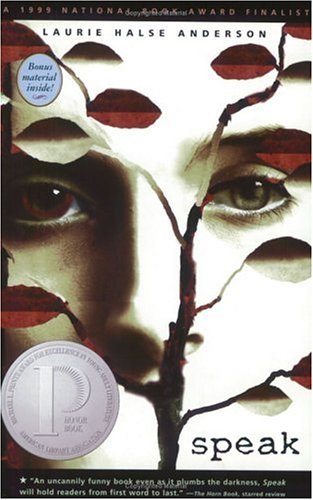

 Twitter and blogs have been buzzing today about a column written by Wesley Scroggins, who would like to see certain novels currently in Missouri school curriculum banned. (He also asserts his issues with sex education.) His main beef is with the novel Speak by Laurie Halse Anderson, which he equates to “soft pornography” due to rape scenes. (Yes, you read that right. He doesn’t understand rape is an act of violence and power, not sex.)
Twitter and blogs have been buzzing today about a column written by Wesley Scroggins, who would like to see certain novels currently in Missouri school curriculum banned. (He also asserts his issues with sex education.) His main beef is with the novel Speak by Laurie Halse Anderson, which he equates to “soft pornography” due to rape scenes. (Yes, you read that right. He doesn’t understand rape is an act of violence and power, not sex.)
Many people have written great blog posts about the importance of books in the classroom, the need for dealing with the harder issues in teen novels and why banning books is so massively wrong. We agree on all points. As such, it is a better use of this blog to share others’ excellent points than to reiterate them ourselves.
Before we jump on that, we’ll say one thing: We encourage parents to pay attention to what their children are reading. Read the books first, read them with your child and help guide them through more difficult works. It will help foster a love of reading, help you understand your child and probably be a great way to connect. Parents have the right to decide what their children read. However, they do not have the right to decide what others’ children read.
Author Andrea Cremer wrote an intelligent response on her blog today. Our favorite part:
…describing a novel about rape and recovery from sexual assault as ‘soft porn’ is precisely a reflection of what happens when sexuality is closeted and not treated as a part of the human experience. It also reinforces the idea that women’s bodies exist only as sexual objects and that violence against women can be viewed as sexual edification for male consumption.
It’s troubling enough that a book like Speak, which offers a safe space for victims of sexual violence to process their experience, is being derided. But the protests themselves against the book are just as disturbing. Sadly, we still live in a society that blames victims of sexual assault and too often treats rape as a ‘normal’ risk for women in society. (Read her post in full)
Jeaniene Frost partly focused on Scroggins’ assertion that the novel was immoral:
As a Christian, I couldn’t disagree more with the notion that schools should censor books that tackle the more unpleasant realities some adolescents are faced with. In fact, I’ll back up my argument with this passage: “Everyone who does evil hates the light, and will not come into the light for fear that his deeds will be exposed.” (John 3:20). Talking about these harsh, ugly issues brings them into the light, ripping away the darkness that their perpetrators hope to use to conceal their actions. I don’t believe Scroggins is trying to create an environment of protection for rapists, but that’s exactly what censorship of the topic combined with what seems to be his refusal to acknowledge that ugly deeds are indeed committed in “nice” areas by “nice” people helps to do. The idea that rape/incest/sexual assault only happens in/to “bad” or “dysfunctional” families is a falsehood that’s sadly still believed in some circles, even though statistics prove otherwise. (Read her full piece, and see the statistics she references on her blog)
Tori from Book Faery talked about her personal experience with Speak, and the reaction she and her friends had to the novel:
None of us were ever raped, thank goodness. But we had issues with our families. Issues with ourselves. Guy issues. Everything a high school student suffers, and then some. And we were silent about it. We thought we had to keep it to ourselves; we thought nobody would care about what we had to say.
SPEAK helped us realize that someone out there, in the world, gave a shit about us. (Read the full post)
Pam from Bookalicious posted the letter to the editor she sent in. In part it reads:
Banning books no matter what the subject matter is risky business. When we have no freedoms left to read, to watch, to SPEAK then where are we left? (Read her letter)
You can also read Laurie’s comments on the opinion piece — and her support from the likes of Judy Blume — on her blog.
Finally, to understand why novels like this is are so vital, we leave you with Speak’s author reading a poem almost entirely composed of reader reactions to the novel. Beware, you will cry.
Want more? Follow the #SpeakLoudly tag on Twitter or check this post on Bookalicious that features links to nearly 100 other bloggers voicing their thoughts on Speak and the request for its ban. You can also order Speak from The Book Depository.


I disagree with those wanting to ban Speak. Speak is not at all graphic. It’s there for awareness and better understanding of these situations. Teens especially need to understand and learn how to appropriately respond to stuff like this. It’s upsetting that someone would want to ban a book that is simple to understand. My younger brother is in high school and not much of a reader, but Speak drew his attention. It’s to keep people from remaining ignorant of the realities. People speak of protection and you can protect yourself by having knowledge of the risks and dangers. Otherwise, Speak is a good piece of literature in itself.